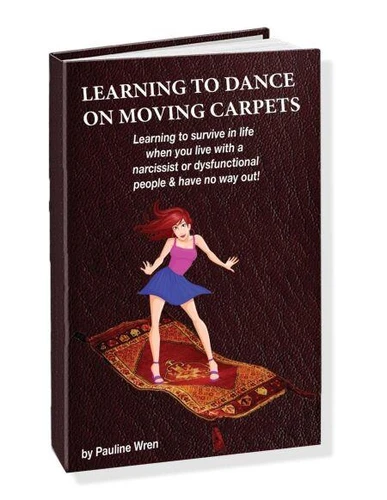Learning to Dance on Moving Carpets
Par :Formats :
Disponible dans votre compte client Decitre ou Furet du Nord dès validation de votre commande. Le format ePub est :
- Compatible avec une lecture sur My Vivlio (smartphone, tablette, ordinateur)
- Compatible avec une lecture sur liseuses Vivlio
- Pour les liseuses autres que Vivlio, vous devez utiliser le logiciel Adobe Digital Edition. Non compatible avec la lecture sur les liseuses Kindle, Remarkable et Sony
 , qui est-ce ?
, qui est-ce ?Notre partenaire de plateforme de lecture numérique où vous retrouverez l'ensemble de vos ebooks gratuitement
Pour en savoir plus sur nos ebooks, consultez notre aide en ligne ici
- FormatePub
- ISBN8223411871
- EAN9798223411871
- Date de parution23/12/2023
- Protection num.pas de protection
- Infos supplémentairesepub
- ÉditeurDraft2Digital
Résumé
This little book aims to share a few of the tools that I've had to learn to manage my life in a very dysfunctional family with two narcissistic parents. Unfortunately, a child brought up in such a family has no resources and few other models than those of her parents to define herself and to help her to develop. She believes that the life she's experiencing is everyone's life and discoveries other models and possibilities only much later.
Unfortunately, the models established early, during the first seven years of childhood, are very difficult to change. It is incredible how many common problematic behaviors dysfunctional people share, whether they are addicts, narcissists, or anything else. They're practising them because they worked for them at that time, but for their victims they leave lasting consequences and ultimately they destroy the relationships that mean the most to them.
There are tools that help us to manage situations and relationships with difficult people which allow us to live in peace, even if we can't really change the external situation. They are tools that I have learned by trial and error, after many years' experience, both professionally and personally, and around the tables of Al-Anon for the families and friends of alcoholics, from CodA Codependents Anonymous, personal therapy, books, conferences, retreats, and from other people who live and work around difficult people.
Infact, they are strategies for living, because a huge percentage of the population displays problematic behavior.
Unfortunately, the models established early, during the first seven years of childhood, are very difficult to change. It is incredible how many common problematic behaviors dysfunctional people share, whether they are addicts, narcissists, or anything else. They're practising them because they worked for them at that time, but for their victims they leave lasting consequences and ultimately they destroy the relationships that mean the most to them.
There are tools that help us to manage situations and relationships with difficult people which allow us to live in peace, even if we can't really change the external situation. They are tools that I have learned by trial and error, after many years' experience, both professionally and personally, and around the tables of Al-Anon for the families and friends of alcoholics, from CodA Codependents Anonymous, personal therapy, books, conferences, retreats, and from other people who live and work around difficult people.
Infact, they are strategies for living, because a huge percentage of the population displays problematic behavior.
This little book aims to share a few of the tools that I've had to learn to manage my life in a very dysfunctional family with two narcissistic parents. Unfortunately, a child brought up in such a family has no resources and few other models than those of her parents to define herself and to help her to develop. She believes that the life she's experiencing is everyone's life and discoveries other models and possibilities only much later.
Unfortunately, the models established early, during the first seven years of childhood, are very difficult to change. It is incredible how many common problematic behaviors dysfunctional people share, whether they are addicts, narcissists, or anything else. They're practising them because they worked for them at that time, but for their victims they leave lasting consequences and ultimately they destroy the relationships that mean the most to them.
There are tools that help us to manage situations and relationships with difficult people which allow us to live in peace, even if we can't really change the external situation. They are tools that I have learned by trial and error, after many years' experience, both professionally and personally, and around the tables of Al-Anon for the families and friends of alcoholics, from CodA Codependents Anonymous, personal therapy, books, conferences, retreats, and from other people who live and work around difficult people.
Infact, they are strategies for living, because a huge percentage of the population displays problematic behavior.
Unfortunately, the models established early, during the first seven years of childhood, are very difficult to change. It is incredible how many common problematic behaviors dysfunctional people share, whether they are addicts, narcissists, or anything else. They're practising them because they worked for them at that time, but for their victims they leave lasting consequences and ultimately they destroy the relationships that mean the most to them.
There are tools that help us to manage situations and relationships with difficult people which allow us to live in peace, even if we can't really change the external situation. They are tools that I have learned by trial and error, after many years' experience, both professionally and personally, and around the tables of Al-Anon for the families and friends of alcoholics, from CodA Codependents Anonymous, personal therapy, books, conferences, retreats, and from other people who live and work around difficult people.
Infact, they are strategies for living, because a huge percentage of the population displays problematic behavior.



